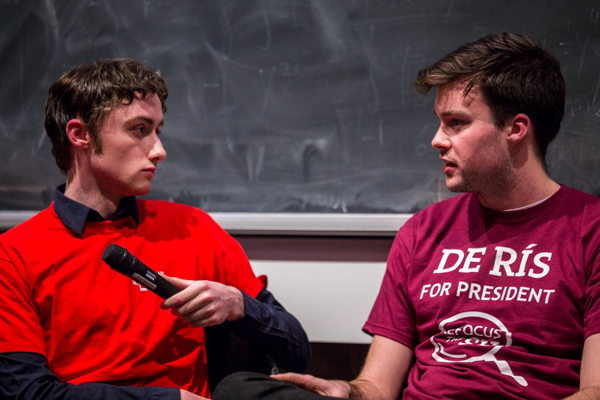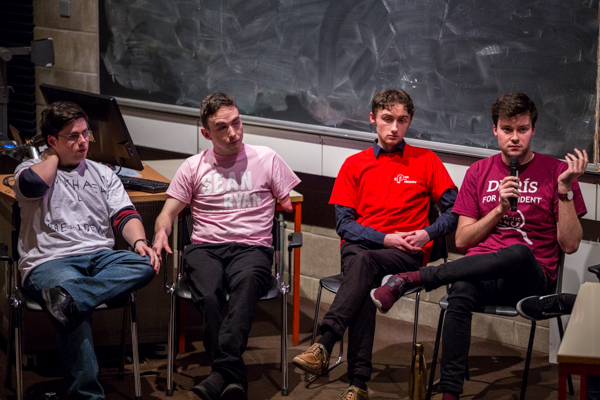Presidential candidates struggled slightly in the different setting of tonight’s The University Times hustings, with personalities clashing as candidates pushed and shoved to get ahead in a race that remains crowded.
Quizzed by a panel of experts, led by President of Cumann Gaelach Ciaran Wadd and Editor of The University Times Dominic McGrath, this was the hustings in which strengths – and weaknesses – really shone through.
In the face of a panel system, with candidates seated and addressing their questioners rather than the crowd for the most part, hustings seemed at times almost more like a discussion than a pitch for votes. If this created an atmosphere ripe for a more substantive discourse, the often-heavy nature of these discussions meant those on stage seemed a little far removed from the audience.
President
Adjusting to the less formal atmosphere under questioning from McGrath, Wadd and the panel, differences became clearer still tonight, as the candidates for president deviated from pre-prepared monologues. Having shone at council hustings yesterday, Michael McDermott struggled to stand out, as the other candidates quickly came to grips with the panel format of the equality hustings.
In response to McGrath’s questioning on cutting costs, both Shane De Rís and Seán Ryan refused to promise large-scale cuts across the union, with Ryan repeating De Rís’s points regarding the union shop. By comparison, both Paul Molloy and McDermott identified areas in which cuts could be made, again focusing on the cost of class representative training.
The panel system also saw fault-lines emerging between candidates for the first time in the campaign, with a heated debate ensuing when De Rís drew exception to Molloy’s attempts to position himself as the authority in the race on the Trinity Education Project. Listing his experience on union committees examining the introduction of the project, he pointedly asked Molloy “what is your experience?”
For his part, Ryan received a now-customary rapturous ovation from his large support base as he refuted questions that his lack of experience may be an issue for his campaign, while reiterating his concerns about the accessibility of the union. Thriving as usual when focusing on union engagement, it was notable that he failed to carve out a distinctive voice, reverting again to the themes that are rapidly becoming a familiar feature of his campaign.
As the now-familiar themes of women in leadership and higher education funding were brought into the spotlight, candidates seemed to be still finding their feet with their answers, even if De Rís seemed the most confident talking about the latter issue.
Following yesterday’s strong performance at council hustings, where his irreverent approach shone, McDermott struggled slightly as he came under stronger scrutiny by the panel, where his customary humour failed to gain traction. If anything, McDermott performed, and struggled, like any conventional candidate. In particular he faltered when questioned about equality, stating that the panel of experts “shouldn’t be asking us, you should be telling us”.

Presidential candidates Molloy and De Rís clashed at tonight’s hustings
Communications and Marketing
The three candidates for the role of communications and marketing faced their toughest assignment yet tonight, with difficult questions being thrown their way at a relentless pace. However, evasive answers were met with a push for specifics.
When asked to criticise previous Communications and Marketing Officers and each other’s manifestos, Harty, who has traded on his “Don’t back a hack” slogan, was surprisingly reticent. Rynne, however, referenced the “vagueness” of Harty’s manifesto, eliciting a predictable reaction from the audience.
The clash between McLean’s union expertise and the outsider status of Harty and Rynne – a constant issue over the last two days – remained in the background for most of the evening.
Although discussions began with a question on marketing, candidates seemed keen to shift the emphasis on to the communications side of things. Unsurprisingly, social media and online engagement were major themes of tonight’s proceedings. Even seemingly unconnected questions, such as one about TCD Plastics Solutions, were brought back into the realm of the digital by Harty, while Rynne, in response to questions, engaged in a lengthy discussion about digitising publications. McLean emphasised the social media aspects of the role, potentially responding to his opponents’ repeated focus on their extensive social media experience.
Rynne, whose straight-talking answers gained big laughs at times, said that “nothing is off the table” when pressed on his bold plans to do away with the print version of The University Times, which he claimed is causing the union to “hemorrhage” money.
Equality and diversity issues faced differing response from candidates. McLean responded well to such questions, gaining whoops and cheers in response to his discussion of LGBT issues, while Rynne’s earnest responses seemed to provoke the audience’s respect. Harty on the other hand seemed sensitive to diversity issues, offering an account of his connection to the LGBT community.
Entertainments
With both candidates acquitting themselves well tonight, the most notable feature was a marked improvement in the performance of David Flood. After a pre-rehearsed speech yesterday, Flood was keen to engage his audience tonight. When asked again about his ideal Trinity Ball headliner, Flood grinned: “I’m ready for this question tonight.”
For Dundon, it was also an improved performance, though he failed once again to address concerns that his campaign focuses too much on alcohol and nights out. When asked how he would facilitate events other than these, his answer lacked specificity, suggesting this issue may not be a priority for him. “There are lots of things Ents have done in past” that he “intends to uphold moving forward”, though he failed to elaborate on these.
With neither candidate keen to stray far from their manifesto, both once again emphasised the key themes which voters have become increasingly familiar with over the last number of days. Flood again pointed out that “no one night can cater for everyone, that’s why we need constantly different events with different themes”, while Dundon pointed to his experience in finding venues across the city which can cater for a variety of needs.
In a departure from the hustings of the last two days, more similarities than differences were highlighted tonight between the candidates. When questioned on a range of issues of diversity, both referred to society collaboration as the most promising avenue to explore, with Dundon pointing out that Ents should be using the financial means it has to “provide a platform” for smaller societies to “take control” showcasing what they are about.
Both candidates responded to questions in Irish, though the earnestness of Flood’s attempt was well received by an audience which responded to his sincere approach. This embodied his overall candour, with Dundon offering once again a more succinct performance.
Education
Sole education candidate Aimee Connolly was once again a picture of calm during her time on stage, even as she repeated similar points to previous nights.
Despite declining to mention it so far in her campaign, tonight Connolly showcased her knowledge of the challenges the Trinity Education Project will present for students. She highlighted access to exam venues for students with disabilities as a pressing issue, but appeared confident in her ability to smooth it over, again citing the importance of case work in her role. Connolly stated her belief that the Trinity Education Project will present little challenge for first-year students, but current Education Officer Alice MacPherson highlighted that there were still many more decisions to be made.
However, when fielding questions from the Equality Panel, Connolly was perhaps slightly short on tangible solutions. Little was offered in the way of concrete ideas for promoting women in leadership roles or increasing diversity on campus, with Connolly merely acknowledging the difficulty of finding a tangible solution to these problems.
With plans to pilot many of her manifesto points next year, it appears that Connolly will forego implementing a long-term change in favour of trialling her many ideas in order to see what will stick.
Welfare
Welfare candidate James Cunningham took to the stage in his now typically comfortable manner. Speaking without a mic, he perhaps needed to remember his audience was there as he primarily addressed the panelists, leaving a largely disengaged room. As an uncontested candidate, however, there is less pressure on Cunningham to offer big answers to the standard welfare questions he was asked. This showed tonight, as he stuck largely to the script, even in the face of more challenging questions than previous appearances, which particularly focused on struggles specific to students from a variety of backgrounds.
Engagement seems key to Cunningham’s campaign. Though unfaltering, his answers rarely broke new ground, as he repeated points he has previously made. From accommodation to ethnic diversity on campus, his emphasis remained firmly on engagement, awareness and communication. Again, his lack of competition meant that he wasn’t particularly challenged in the variety of his responses.
On only one question were his manifesto points taken up. It pertained to Cunningham’s aim to bring consent workshops onto campus and other areas of Trinity, and how specifically he plans to accomplish it. His response again centred around engaging interested students through co-operation with student societies to increase the outreach, chiming with manifesto points and his emphasis on communication. His answer to this, perhaps understandably, was consistent with his manifesto points and his answers in previous hustings.
Editor
Candidate for Editor of The University Times Eleanor O’Mahony’s passion for the paper was evident throughout as she engaged with panel and audience questions. However, a lack of concision meant she risked at times losing the audience.
This was particularly evident in her response to a question from President of Trinity College Dublin Students’ Union (TCDSU) Kevin Keane on how O’Mahony plans to reduce the cost of printing the paper.
O’Mahony acknowledged that “media and advertising is changing” and promised to cut the paper’s costs. She did, however, insist that the paper provides a vital service to students, and expressed fears that it would be forgotten should the budget be cut.
O’Mahony struggled slightly with a question about the need for two newspapers, becoming slightly flustered and repeating herself. She did, however, ultimately land a solid line, insisting that “there is an appetite for student journalism that can fill both papers”.
Generally, O’Mahony expressed optimism for the future in attracting more casual readers, and elaborated on some of her points more so than she did at council hustings. Similar to the two uncontested candidates, however, and perhaps due to the mechanics of the hustings, she struggled slightly to engage her audience.
Correction: 09:48, February 15th, 2018
Due to an editing error, an earlier version of this article described O’Mahony as “similar to other uncontested candidates”. In fact, it should have stated that O’Mahony was uncontested on stage during the hustings. Her opponent, Michael McDermott, has consistently spoken alongside the presidential candidates at hustings.
Ciaran Molloy, Jack Synnott, Aoife Kearins, Sophie Andrews-McCarroll, Joe Dudley, Aaron Finnegan, Louise McCormack and Ellen McLean contributed reporting to this piece.







